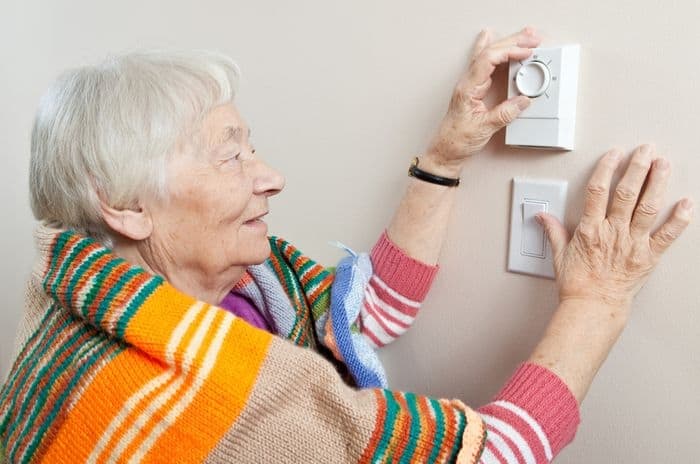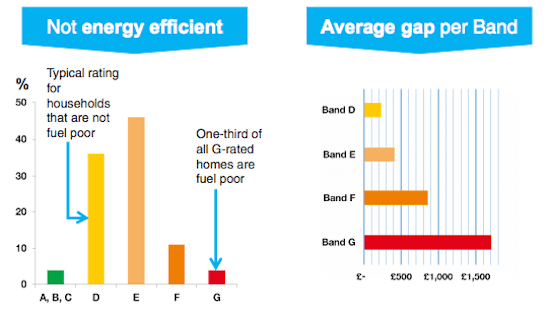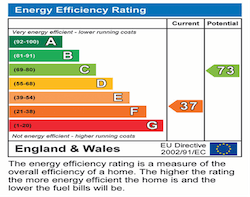Home > Energy > News > Government sets 'meaningless' targets to stop fuel poverty
Government sets 'meaningless' targets to stop fuel poverty
LAST week, the Government unveiled new plans to stop fuel poverty by making homes more energy efficient.

About 10% of UK households struggle to heat their homes to a reasonable level and the vast majority of those, 95%, have an energy efficiency rating of below C (the scale goes down to G).
Homes that move up the scale from a G to a C rating typically save around £1,000 a year on their energy bills, so rolling out improvements like wall and loft insulation and upgraded boilers to low income households really could reduce fuel poverty levels significantly, if they went to a lot of homes.

SOURCE: August 2014 DCMS report 'Cutting the cost of keeping warm' available here (pdf).
So will they? How many of the 2.33 million properties expected to choose between heating and eating in 2014 will get improvements?
Improbably, that's a question the Government doesn't have an answer for.
The proposal is to improve as many fuel poor homes "as reasonably practicable" to energy efficiency rating E by 2020, band D by 2025 and, finally, band C by 2030.
'Meaningless' targets
As you may have noticed already, a target to upgrade "hmmm, I don't know some" homes in the next fifteen years is not really a target at all.
and energy efficiency
"The caveat only to do what is 'reasonably practicable' makes the pledge meaningless," Sophie Neuburg, Friends of the Earth's fuel poverty campaigner says.
"There must be a firm Government commitment to bring all low income homes up to high energy efficiency standards, with no get out clauses."
Age UK were also unimpressed with the new plans.
"Cold homes are a huge factor when it comes to the shocking numbers of excess winter deaths each year," Caroline Abrahams, the later life charity's Charity Director said.
"The only viable long term solution for fuel poverty is to make peoples' homes as energy efficient as quickly as possible. What we need is a more determined energy efficiency programme that brings all housing up to standard as soon as possible," Abrahams added.

Prescriptions for heating
The Government has responded by saying that a lack of concrete targets isn't the same as a lack of commitment and, in fact, the vagueness of the new proposals will give them more scope to pursue new policies.
In Sunderland, for example, a small scale trial has seen GPs giving out 'prescriptions' for insulation or new boilers to those with illnesses caused or aggravated by living in a cold home.
Yet, charities reply, the lack of real targets in the national strategy for tackling fuel poverty shows that the Government is refusing to be accountable and isn't taking the issue seriously enough.
A report released in March this year found that Government support for fuel poor homes has fallen 30% since 2010.
MPs might be taking this approach, in part, because levels of fuel poverty have declined slightly in the past year.
How fuel poverty is changing
In a recent debate on energy Ed Davey MP said, "fuel poverty went up under the previous Government, but under this Government it has gone down by 5% according to the latest figures."
"The Secretary of State once again manipulates the figures, and I think it is a bit of a con," John Robertson, the MP for Glasgow North West, responded.
Robertson is alluding to a change in the definition of fuel poverty which did indeed reduce the number of households classed as fuel poor but Davey's claim is borne out by both the old and the new measure. Both show the number of fuel poor households falling over the past ten years.
The number of households is just one measure, however.
In the past ten years, the 'fuel poverty gap', the amount a household needs to spend to get their heating to a reasonable level, has been steadily increasing.
In 2004, adjusting for inflation, it was £150; in 2014, it's £480.
There are also more fuel poor households than ever with young children, the most vulnerable and blameless victims of living in a cold home.
Receive consumer updates that matter in our newsletter

We are independent of all of the products and services we compare.

We order our comparison tables by price or feature and never by referral revenue.

We donate at least 5% of our profits to charity, and we aim to be climate positive.
Latest News

2 January 2024
Energy prices increase by 5%
23 November 2023
Energy price cap to rise 5% in January 2024
24 October 2023
Energy companies must do more to support customers

